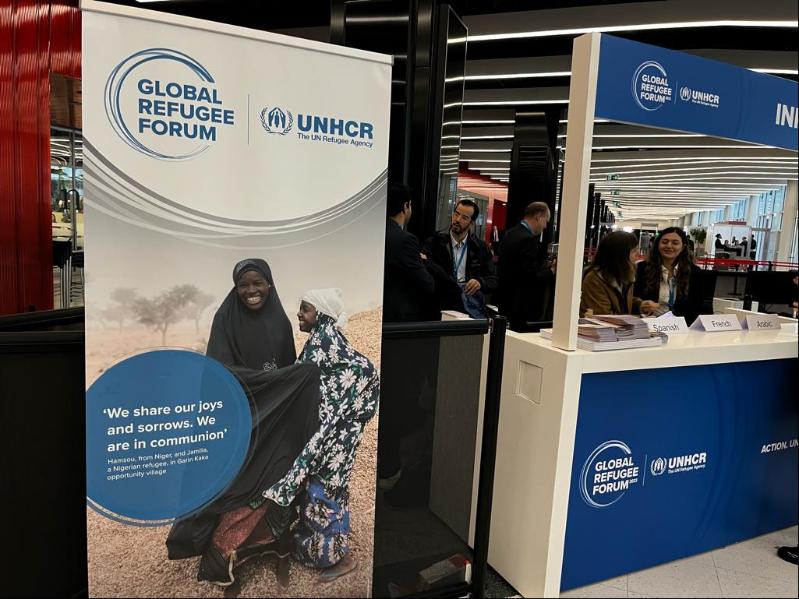
- The EIB has joined pledges with the EU, multilateral development banks and the OECD.
- This underscores the Bank’s dedication to supporting host and origin communities.
- Fostering economic resilience and social inclusion remain an EIB priority.
At the 2023 Global Refugee Forum, the European Investment Bank (EIB) reaffirmed its commitment to supporting the needs of refugees, building longer-term economic resilience in host and origin communities, and promoting social inclusion.
The EU bank contributed to several institutional pledges and multi-stakeholder statements with partners from the European Union, multilateral development banks (MDBs) and the Organisation for Economic Co-operation and Development (OECD).
EIB Vice-President Gelsomina Vigliotti stated, "Migration is about so much more than just crossing borders. It is also about people showing strength, bravery and hope for a better tomorrow. At the EIB we will continue to ensure that our investments support host and origin communities and uplift refugees, recognising the important role they can play in diverse societies. Working with our partners, the EIB is committed to fostering economic resilience in the places migrants come from and where they go, generating jobs and opportunities for everyone. Our focus is on building strong partnerships to create shared prosperity and global well-being."
European Union pledges
As Team Europe, the EIB and the European Union’s pledges contribute to achieving the objectives of the Global Compact on Refugees — in particular, helping forcibly displaced persons via the EIB Solidarity Package of €4 billion. This includes financial support, free advisory services and technical assistance to local, regional and national authorities in the EU to help them develop and expand critical social infrastructure and services for Ukrainians and host communities, such as housing, schools and hospitals. Poland and the Czech Republic are currently implementing projects with this EIB support.
The Bank is also working to help alleviate the Syrian displacement crisis, supporting climate action, refugee education, economic inclusion, social protection and integration, and enhancing gender equality while protecting refugees and migrants from gender-based violence.
The European Union and its Member States constitute the leading contributor to addressing displacement crises, providing 42% of global funding for refugees in low- and middle-income countries. Each year, 80% of the EU humanitarian budget goes to projects that benefit displaced persons and host communities. The European Union combines humanitarian, development and peace strategies to facilitate the transition from emergency assistance to long-term solutions.
MDB Coordination Platform joint commitments
Acknowledging the increase in mobility, fragility and conflicts, the EIB and fellow MDBs reaffirmed their commitment to supporting countries of origin, transit areas, host communities, refugees, internally displaced persons, returnees and migrants in refugee-like situations through targeted financing, policy instruments and research, and through the MDB Platform on Economic Migration and Forced Displacement.
Founded by the EIB and the World Bank, the MDB Platform on Economic Migration and Forced Displacement seeks to foster strategic alignment among MDBs, and to strengthen operational coordination and knowledge sharing to leverage opportunities for cross-cutting benefits.
In their 2023 Joint Commitments, MDBs identified further priority areas for the MDB Coordination Platform to focus on in the coming years: promoting holistic approaches, advancing collaboration, deepening coordination on analytics and knowledge, improving monitoring and evaluation, and exploring innovative financing mechanisms.
In addition, MDBs committed to strengthening their partnership with strategic stakeholders, including the United Nations High Commissioner for Refugees (UNHCR) and the International Organization for Migration (IOM), civil society, the private sector and partners across the humanitarian-development-peace nexus, to maximise their collective development impact.
OECD INCAF common position
The International Network on Conflict and Fragility (INCAF) is a network of OECD Development Assistance Committee (DAC) members and key multilateral agencies working in fragile and conflict-affected contexts.
The INCAF adopted a common position on “Addressing forced displacement with a comprehensive Humanitarian-Development-Peace nexus approach.” It is a framework to guide development cooperation in addressing refugee, internal displacement and statelessness situations in low- and middle-income countries. The INCAF supports the implementation of the Global Compact on Refugees and the UN Action Agenda on Internal Displacement.
The EIB helped develop the common position, and fully supports it. It focuses on three engagement areas, including coordinating responses to urgent needs: for example, displaced populations in sustainable development and climate action, addressing recurring drivers of forced displacement, emphasising peacebuilding, private sector investments and policy dialogue.
Read the EIB blog: Climate adaptation priority to manage migration impacts
Background information
About the European Investment Bank
The EIB is the long-term lending institution of the European Union and is owned by the EU Member States. It makes long-term finance available for sound investment to pursue EU policy goals in Europe and beyond, including the UN Sustainable Development Goals.
EIB Global is the EIB Group’s specialised arm for operations outside the European Union, and a key partner of the EU Global Gateway strategy. We aim to support at least €100 billion of investment by the end of 2027, around one-third of the overall target of Global Gateway. Within Team Europe, EIB Global fosters strong, focused partnerships alongside fellow development finance institutions and civil society. EIB Global brings the EIB Group closer to local communities, companies and institutions through our offices across the world.
About the Global Refugee Forum
The Global Refugee Forum is the world’s largest international gathering on refugees. Held every four years, it is designed to support the practical implementation of the objectives set out in the Global Compact on Refugees. It aims to ease pressure on host countries, enhance refugee self-reliance, increase access to third-country solutions and improve conditions in countries of origin.
The Global Refugee Forum is an opportunity for states and stakeholders to announce concrete pledges and contributions, highlight progress made, share good practices and take stock of the challenges and opportunities ahead. The 2023 forum is co-convened by Colombia, France, Japan, Jordan and Uganda, and co-hosted by the government of Switzerland and UNHCR.